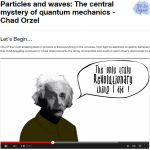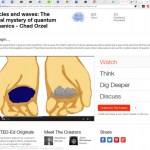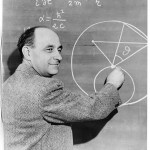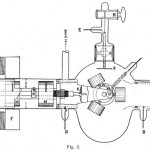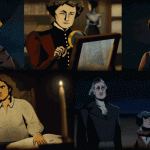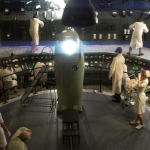History of Science
Modern media being what it is, I should get out in front of this, so: I am guilty of putting words in Einstein's mouth. I mean, go watch my TED-Ed video on particles and waves, or just look at the image up top-- that very clearly shows Einstein saying words that he probably never said. And it's my fault.
Well, OK, I didn't actually put those words in his mouth-- the animator did that. What I wrote is "Einstein himself described [the photoelectric effect] as the only truly revolutionary thing he did." Which isn't really a quote, but a paraphrase. And it's really a paraphrase of something…
My TED@NYC adventure last fall didn't turn into an invite to the big TED meeting, but it did lead to a cool opportunity that is another of the very cool developments I've been teasing for a while now: I've written some scripts for lessons to be posted with TED-Ed. The first of these, on particle-wave duality just went live today.
The content here is very similar to my talk last fall, which is, in turn, very similar to Chapter 8 of Eureka: a historical survey of the development of quantum physics. I did the script for this, which was then turned over to professional animators, who did a great…
OK, the photo above is a recent picture of me-- yesterday, in fact. But the spiral-carved rock I'm standing next to was carved that way a bit more than five thousand years ago, so that ought to count as a throwback...
We've been in Dublin the last few days, and on Thursday we took a bus tour out to Newgrange. this is one of the things I wanted to make sure to see while we were here, as I make reference to it in the forthcoming book, and at least two classes that I teach. And it is, indeed, spectacular; the reconstructed white wall might be historically dubious, but the interior passage and…
Given the recent Feynman explosion (timeline of events), some people may be casting about looking for an alternative source of colorful-character anecdotes in physics. Fortunately, the search doesn't need to go all that far-- if you flip back a couple of pages in the imaginary alphabetical listing of physicists, you'll find a guy who fits the bill very well: Enrico Fermi.
Fermi's contributions to physics are arguably as significant as Feynman's. He was the first to work out the statistical mechanics of particles obeying the Pauli exclusion principle, now called "fermions" in his honor (Paul…
I should really know better than to click any tweeted link with a huff.to shortened URL, but for some reason, I actually followed one to an article with the limited-reach clickbait title Curious About Quantum Physics? Read These 10 Articles!. Which is only part one, because Huffington Post, so it's actually five articles.
Three of the five articles are Einstein papers from 1905, which is sort of the equivalent of making a Ten Essential Rock Albums list that includes Revolver, Abbey Road, and the White Album. One of the goals of a well-done list of "essential" whatever is to give a sense of…
The surest sign that I've become a Real Author is that there are five months yet before Eureka comes out, and I'm already fretting about negative reviews. Negative reviews that haven't happened yet, but that I know will come, in a particular form.
The book, as you probably know from my prior ramblings on this subject, contains a large-ish number of historical anecdotes illustrating particular aspects of the scientific process, and relating them to everyday activities (rough list in this post). The thing that I worry about is that I decided early on to make a conscious effort to keep the whole…
The physics vs. philosophy slow-motion blogfight continues, the latest major contribution being Sean Carroll's "Physicists Should Stop Saying silly Things About Philosophy. I've been mostly trying to stay out of this, but when I read through the comments at Sean's post to see if anybody offered any specific examples of problems that could've been avoided by talking to philosophers, I was kind of surprised to find a lot of people talking up Niels Bohr. (Likewise Ashutosh Jogalekar's Philosophy Begins Where Physics Ends....) If you're trying to talk up the virtues of philosophy over "pure"…
The Cosmos reboot season finale (or possibly series finale; not sure if they're trying for a second set of episodes) was last night, but I wasn't able to take part in the live-tweeting of it thanks to a super-restless Pip who didn't drop off until 9:30 EDT. I suppose I could've waited to start the DVR until I would synch up with the West Coast showing, but then, I also need sleep. and I greatly enjoyed being able to fast-forward through the innumerable commercials.
And, really, if you want the story of the Cosmos reboot in a nutshell, there's no better capsule summary than the treatment of…
While solo-parenting Sunday night, I still managed to get free of The Pip just barely in time to catch the start of Cosmos. This was a strange episode in a couple of ways, chiefly having to do with the selection of topics.
For one thing, there's no small irony in the fact that following a couple of weeks in which host Neil deGrasse Tyson has been raked over metaphorical coals for dismissing philosophy as pointless because it doesn't lead to testable predictions, a big chunk of the episode was given over to wildly impractical speculations about panspermia and related topics. I realize it's…
A couple of weeks ago, io9 ran a piece about the old accusations that Robert Millikan manipulated his data for the electron charge with the headlineDid a Case of Scientific Misconduct Win the Nobel Prize for Physics? that got a lot of attention. I wasn't as impressed with this as a lot of other people, mostly because it's mostly just adding a clickbait headline to a story that's been around for decades, and doesn't even really engage with the various responses and defenses of Millikan, including this PDF that offers a (to my mind) fairly convincing argument that most of the argument turns on…
Last night's episode of the Cosmos reboot focused on one of the three physicists whose pictures Einstein kept in his office: Michael Faraday. I'm a big fan of Faraday, who famously started his career as a bookbinder's apprentice reading the books brought into the shop, and ended as one of the greatest experimental physicists of the 19th Century. Also, he had magnificent sideburns, as you can see in the picture. It's a great story-- I highly recommend his biography-- and pretty much the entire episode was devoted to Faraday, with only a surprisingly tenuous astronomy connection at the end,…
I have a couple of things in the mental queue for this week, but I'm still playing catch-up from my trip to Texas, so instead you get a really quick comment on last night's Cosmos. This one was all about the history of the Earth-- continents moving, climate changing, mass extinctions-- stuff that I know in outline, but not detail. It was, by and large, far enough from my areas of expertise that I can't say much.
I did think that some parts of it were a little too pat, though. These fall into two categories: just-so stories, and things obvious in hindsight. The former includes the very…
Back when the first episode of the Cosmos reboot aired, somebody put together a composite of the cartoon people who flashed on screen, and we played a guessing game on Twitter. The image above is from a blog post by Meg at True Anomalies, and I think it was probably her, but the ephemeral nature of Twitter makes it annoying to track down the original discussion.
Anyway, we collectively got four of the five right: ibn al-Haytham in the upper left, Annie Jump Cannon in the middle top, Isaac Newton on the lower left, and William Herschel on the lower right. Well, five of six, if you include…
I'm not really a comic-book guy, but I've watched a bunch of comic-book movies recently. Kate was really fired up for the new Captain America movie, so I finally got around to watching the first one as background for that, then when I was sleep-deprived last week I watched the second Thor movie via on-demand cable, then Sunday evening Kate and I went to see Captain America: The Winter Soldier in the theater (her second time watching it-- she's really fired up).
Mostly, this has served to confirm that I'm not a comic-book guy. I'm just not invested enough in the idea of a movie about these…
Another Monday, another recap of a new episode of the Cosmos reboot. This one was all about optics, and much of it was excellent. This was in part due to the fact that its first couple of historical segments focused on non-Western figures, and I don't know as much about their background to be able to nitpick. First up was Mozi, a Chinese philosopher from circa 400BCE, who may have been the first to demonstrate the camera obscura technique of projecting images from a pinhole in the wall of a dark room. He was followed by ibn al-Haytham, circa 1000CE, who did the first fairly complete analysis…
The fourth episode of the Cosmos reboot aired last night, and as I said on Twitter it was a beautiful demonstration of why I'm finding this show intensely frustrating. There were flashes of brilliance, but also quite a few bits that left me shaking my head. Thus fitting the pattern of the previous episodes-- I didn't comment on last week's, because I was taking a break, but it had the same sorts of issues, too-- so I guess that's just what this show is.
Again, there was some very good stuff-- the opening framing device with William Herschel talking about ghosts was great, and Tyson's tour…
In which Rhett and I chat about the hot new discovery of primordial gravitational waves (maybe) very briefly before segueing into talking about LIGO, and Cosmos, and why "theory" is a terrible word, and the memorization of constants, and standardized tests, and time-lapse videos. You know, as one does.
Miscellaneous items:
-- I'm a little pixellated, as if I'm concealing my identity. I forgot to shut Kate's computer down, so it may have been doing online backups that chewed up bandwidth.
-- The von Neumann quote I butcher at one point is "The sciences do not try to explain, they hardly even…
The other big nerd event of today is that it's Einstein's birthday, on this date back in 1879. I keep meaning to take and post a photo of the cool picture of Einstein we have in the department's collection of stuff, and this is as good an excuse as any.
Charcoal drawing of Einstein giving a talk in Schenectady in 1939. The original is in the Department of Physics and Astronomy office, donated by Carl George, who I think got it from the artist originally.
If not for him, we wouldn't have anything to sarcastically call smart people who do dumb things. Oh, yeah, and the whole General…
It says here in the fine print that my blogging license could be revoked if I fail to offer a public opinion on the Cosmos reboot, which premiered last night. I missed the first couple of minutes-- I had The Pip for bedtime, and he didn't start snoring until 8:58-- but saw most of it in real time. I posted a bit of commentary on Twitter, but will offer something marginally less ephemeral here.
The show opened and closed with tributes to Carl Sagan, and Neil deGrasse Tyson standing on the same cliff where Sagan opened the original series back in 1980. That was good and fitting, and Tyson's…
Given the academic circles I run in, it's not surprising that one of the most repeated stories crossing my social media feeds yesterday had to do with the changes to the SAT. Starting in 2015, the essay section will no longer be mandatory, and they're going to reconfigure the reading and math sections to emphasize different categories of questions.
My slightly cynical take on this is that changes seem to be driven more by marketing than education-- stories about this all mention that the changes make the new SAT more like the ACT, which has been gaining in popularity in recent years. Which…
